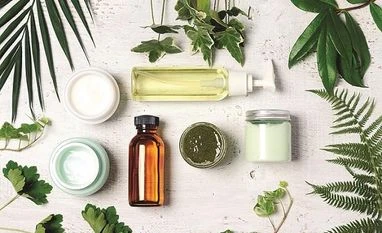The demand for organic products (and other characteristics subsumed under the term green labelling) is growing at a phenomenal pace. According to a recent report by Euromonitor, one of the mega trends driving the Indian beauty industry is ‘ethical living’. Buyers of beauty and personal care products are increasingly keen to indulge in what the report calls, meaningful consumerism, or buy products that are eco-friendly, organic, natural and recyclable.
But how does one define organic and how do brands cast their claims in stone? N Chandramouli, founder, Trust Research Advisory, says much of the good that comes with the term ‘organic’ has its bad elements. “Organic is defined as produce that has no toxic impact on people and the environment. But it is tough to check and verify all these aspects. Fully organic is that which is organically cultivated, no chemical fertilisers for a minimum of five years,” he says.
Moreover the difference between organic, herbal, ayurvedic, and natural is subtle and not always clearly understood. According to Rahul Agarwal, CEO, Organic Harvest, which retails personal care and beauty product, consumers fail to get the desired results because they don’t know how to differentiate between the four. “Brands need to make consumers more aware about the process of making of the product to ensure long-standing relationships,” he adds.
In the personal care sector, currently the only agency authorised to classify products as organic, is the France-based ECOCERT, says Abhinandan Dhoke, CEO of Organic India that sells a range of products in the food and personal care categories. Brands are thus keen to seek its stamp on their labels. “The certification is evidence that the raw materials used for our products are derived from plants and natural extracts that have been grown without any chemical fertilisers, herbicides and pesticides,” says Agarwal.
Increased scrutiny and better labelling among beauty brands mirrors the trend previously seen in the food industry. “Changing consumer perception coupled with growing use of environmentally sustainable products has fuelled growth in the organic personal care industry,” feels Agarwal.
Do big brands have an advantage when it comes to trust? Unilever, Procter & Gamble, L’Oreal have a range of products with clean and green labels. Not so much, if one goes by the customer research emerging on the subject. Across the world, the young are showing a greater distrust of big brands and according to Deloitte’s report, Unravelling the Indian consumer (February 2019), consumers are interested in understanding the complete value chain of the products they consume. They want to know where it was made, how it was procured and the processes it underwent before hitting the shop shelves and they also look for information about the company’s waste recycle/reuse processes. Size and age do not matter.
Chandramouli believes that the trend towards organic consumerism could eventually turn into good for all, not just consumers and brands but even for the farmer/herbalist. “With proper organic product ratings, better farmer awareness, better consumer knowledge, we should see a robust and flourishing industry in the next 3 years,” he adds.
According to a report by Euromonitor, the premium beauty and personal care (which includes organic and natural products) retail value sales in India logged in $774 million in 2018 and per capita expenditure on this category would grow at 15 per cent CAGR (compound annual growth rate) over 2018-2023. The survey also showed that 65 per cent of the respondents said they trusted an organic label. But companies and experts say that heartening though that is, customers are as quick to withdraw their trust from such labels as they are to repose their faith in them. Without trust, organic brands have a slippery climb ahead.
To read the full story, Subscribe Now at just Rs 249 a month
Already a subscriber? Log in
Subscribe To BS Premium
₹249
Renews automatically
₹1699₹1999
Opt for auto renewal and save Rs. 300 Renews automatically
₹1999
What you get on BS Premium?
-
Unlock 30+ premium stories daily hand-picked by our editors, across devices on browser and app.
-
Pick your 5 favourite companies, get a daily email with all news updates on them.
Full access to our intuitive epaper - clip, save, share articles from any device; newspaper archives from 2006.
Preferential invites to Business Standard events.
Curated newsletters on markets, personal finance, policy & politics, start-ups, technology, and more.
Need More Information - write to us at assist@bsmail.in
)